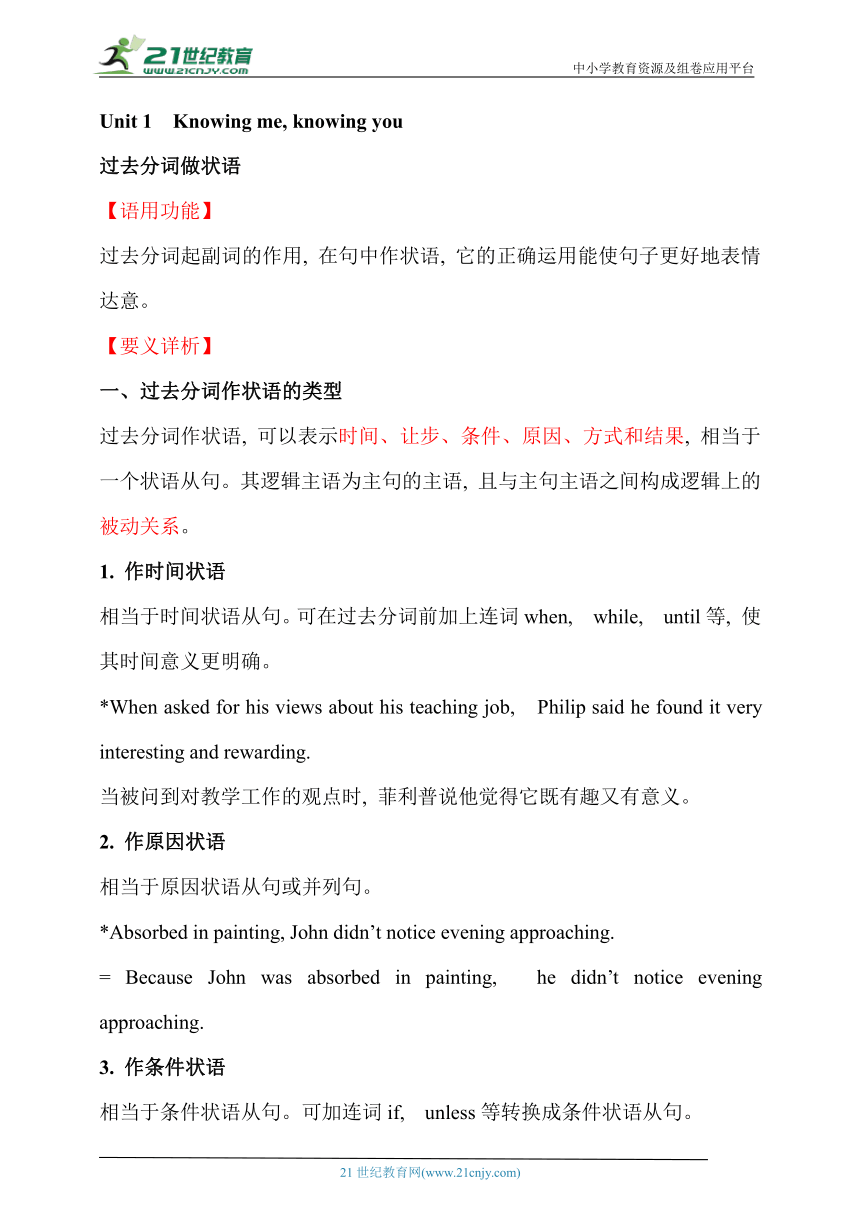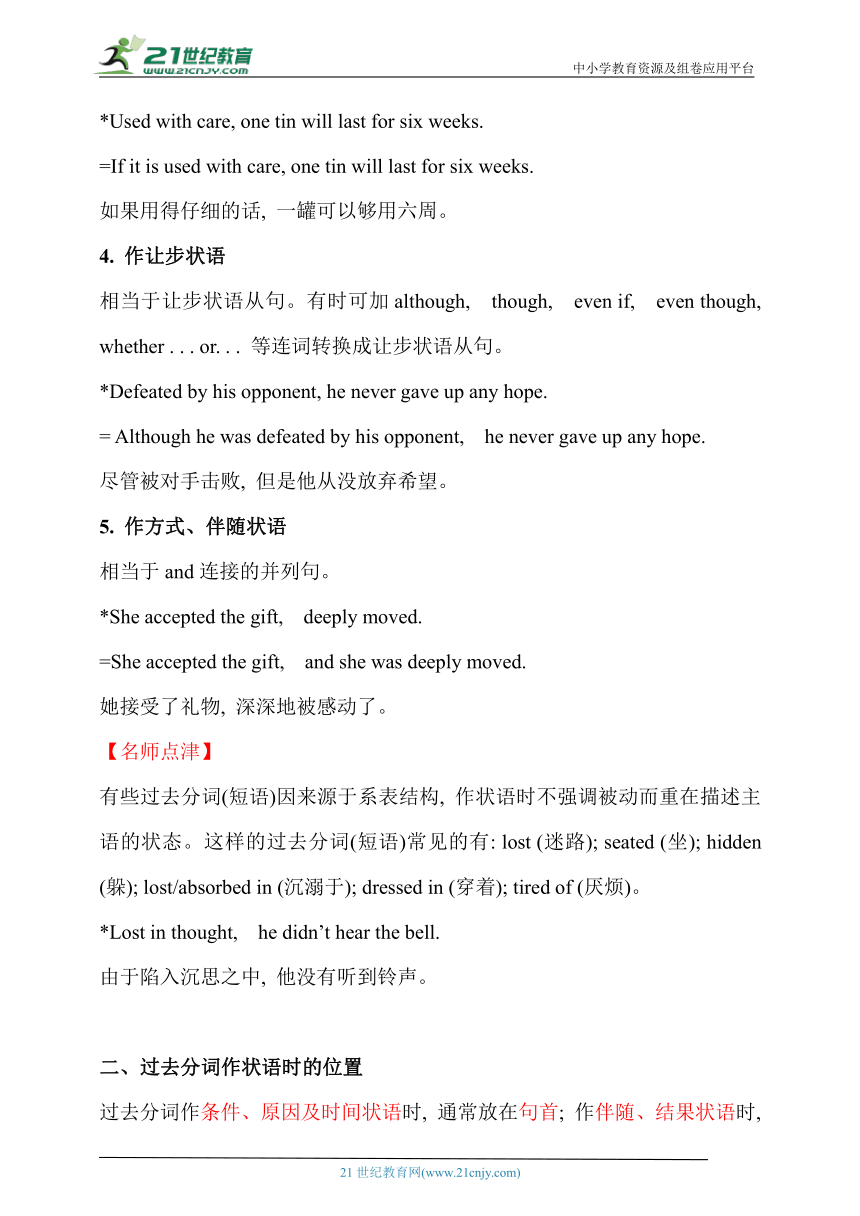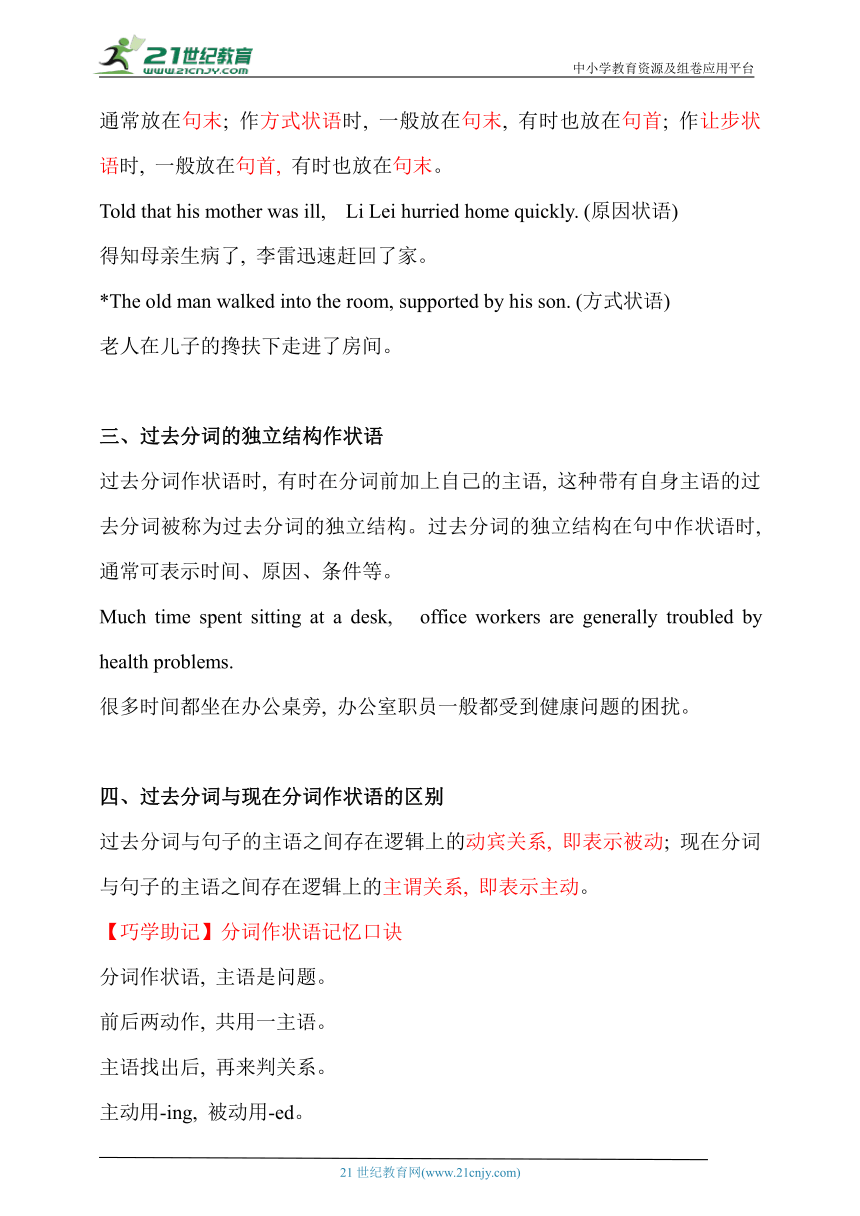(2019外研版)必修三unit 1 讲义(精讲)
文档属性
| 名称 | (2019外研版)必修三unit 1 讲义(精讲) |

|
|
| 格式 | doc | ||
| 文件大小 | 276.0KB | ||
| 资源类型 | 试卷 | ||
| 版本资源 | 外研版(2019) | ||
| 科目 | 英语 | ||
| 更新时间 | 2024-05-06 19:27:19 | ||
图片预览



文档简介
中小学教育资源及组卷应用平台
Unit 1 Knowing me, knowing you
过去分词做状语
【语用功能】
过去分词起副词的作用, 在句中作状语, 它的正确运用能使句子更好地表情达意。
【要义详析】
一、过去分词作状语的类型
过去分词作状语, 可以表示时间、让步、条件、原因、方式和结果, 相当于一个状语从句。其逻辑主语为主句的主语, 且与主句主语之间构成逻辑上的被动关系。
1. 作时间状语
相当于时间状语从句。可在过去分词前加上连词when, while, until等, 使其时间意义更明确。
*When asked for his views about his teaching job, Philip said he found it very interesting and rewarding.
当被问到对教学工作的观点时, 菲利普说他觉得它既有趣又有意义。
2. 作原因状语
相当于原因状语从句或并列句。
*Absorbed in painting, John didn’t notice evening approaching.
= Because John was absorbed in painting, he didn’t notice evening approaching.
3. 作条件状语
相当于条件状语从句。可加连词if, unless等转换成条件状语从句。
*Used with care, one tin will last for six weeks.
=If it is used with care, one tin will last for six weeks.
如果用得仔细的话, 一罐可以够用六周。
4. 作让步状语
相当于让步状语从句。有时可加although, though, even if, even though, whether . . . or. . . 等连词转换成让步状语从句。
*Defeated by his opponent, he never gave up any hope.
= Although he was defeated by his opponent, he never gave up any hope.
尽管被对手击败, 但是他从没放弃希望。
5. 作方式、伴随状语
相当于and连接的并列句。
*She accepted the gift, deeply moved.
=She accepted the gift, and she was deeply moved.
她接受了礼物, 深深地被感动了。
【名师点津】
有些过去分词(短语)因来源于系表结构, 作状语时不强调被动而重在描述主语的状态。这样的过去分词(短语)常见的有: lost (迷路); seated (坐); hidden (躲); lost/absorbed in (沉溺于); dressed in (穿着); tired of (厌烦)。
*Lost in thought, he didn’t hear the bell.
由于陷入沉思之中, 他没有听到铃声。
二、过去分词作状语时的位置
过去分词作条件、原因及时间状语时, 通常放在句首; 作伴随、结果状语时, 通常放在句末; 作方式状语时, 一般放在句末, 有时也放在句首; 作让步状语时, 一般放在句首, 有时也放在句末。
Told that his mother was ill, Li Lei hurried home quickly. (原因状语)
得知母亲生病了, 李雷迅速赶回了家。
*The old man walked into the room, supported by his son. (方式状语)
老人在儿子的搀扶下走进了房间。
三、过去分词的独立结构作状语
过去分词作状语时, 有时在分词前加上自己的主语, 这种带有自身主语的过去分词被称为过去分词的独立结构。过去分词的独立结构在句中作状语时, 通常可表示时间、原因、条件等。
Much time spent sitting at a desk, office workers are generally troubled by health problems.
很多时间都坐在办公桌旁, 办公室职员一般都受到健康问题的困扰。
四、过去分词与现在分词作状语的区别
过去分词与句子的主语之间存在逻辑上的动宾关系, 即表示被动; 现在分词与句子的主语之间存在逻辑上的主谓关系, 即表示主动。
【巧学助记】分词作状语记忆口诀
分词作状语, 主语是问题。
前后两动作, 共用一主语。
主语找出后, 再来判关系。
主动用-ing, 被动用-ed。
Used for a long time, the book looks old. (动宾关系)
由于用了很长时间, 这本书看上去很旧。
*Using the book, I find it very useful. (主谓关系)
在使用这本书时, 我发现它很有用。
知识点1:The +比较级,the+比较级
The more independent you are, the better your life will be.
你越独立你的生活就会越好。
【句式解构】
(1)该句使用了“the+比较级. . . , the +比较级. . . ”结构, 意为“越……, 就越……”, 表示一方的程度随着另一方的变化而变化, the用在形容词或副词的比较级前。
(2)前一个“the+比较级”通常相当于比较状语从句或条件状语从句, 后一个“the+比较级”通常相当于主句。
(3)在通常情况下, 如果主从句中的谓语动词是系动词be, 而且主语不是代词, be常省略。
*The taller the tree (is), the stronger the wind (is).
树大招风。
*The more books you read, the wiser you will be.
你读的书越多, 你就越聪明。
*The sooner, the better. 越快越好。
【知识延伸】
“比较级+and+比较级”则表示“越来越……”。
知识点2 not only...but also as well as
【名师点津】
(1) not only. . . but also. . . 强调的是后者, sth. as well as sth. 强调的是前者。
(2)as well as连接两个并列主语时, 谓语动词在数上和形式上要和as well as前面的主语保持一致。
知识点3whatever/whoever/whichever...用法:
Filled with anger, you tend to say whatever comes to your mind.
满腔怒火时, 你想到什么就会说什么。
【句式解构】
句中whatever comes to your mind为whatever引导的宾语从句, whatever相当于anything that。whatever除了引导名词性从句外, 还可以引导让步状语从句, 相当于no matter what。
Now that I have passed my exams, I can do whatever I like.
既然我考试及格了, 我可以做任何我喜欢的事了。
* Whatever you do, you can’t go against nature.
=No matter what you do, you can’t go against nature.
无论你做什么, 你都不能违反自然。
【名师点津】whatever/whoever/whichever这一类词既可引导名词性从句, 也可引导让步状语从句; 而however/wherever/whenever一般只引导让步状语从句。
*He can answer the question however hard it is.
无论问题有多难, 他都能回答。(让步状语从句)
*Whoever breaks the law should be punished.
任何人违法都要受到惩罚。(主语从句)
21世纪教育网 www.21cnjy.com 精品试卷·第 2 页 (共 2 页)
21世纪教育网(www.21cnjy.com)
Unit 1 Knowing me, knowing you
过去分词做状语
【语用功能】
过去分词起副词的作用, 在句中作状语, 它的正确运用能使句子更好地表情达意。
【要义详析】
一、过去分词作状语的类型
过去分词作状语, 可以表示时间、让步、条件、原因、方式和结果, 相当于一个状语从句。其逻辑主语为主句的主语, 且与主句主语之间构成逻辑上的被动关系。
1. 作时间状语
相当于时间状语从句。可在过去分词前加上连词when, while, until等, 使其时间意义更明确。
*When asked for his views about his teaching job, Philip said he found it very interesting and rewarding.
当被问到对教学工作的观点时, 菲利普说他觉得它既有趣又有意义。
2. 作原因状语
相当于原因状语从句或并列句。
*Absorbed in painting, John didn’t notice evening approaching.
= Because John was absorbed in painting, he didn’t notice evening approaching.
3. 作条件状语
相当于条件状语从句。可加连词if, unless等转换成条件状语从句。
*Used with care, one tin will last for six weeks.
=If it is used with care, one tin will last for six weeks.
如果用得仔细的话, 一罐可以够用六周。
4. 作让步状语
相当于让步状语从句。有时可加although, though, even if, even though, whether . . . or. . . 等连词转换成让步状语从句。
*Defeated by his opponent, he never gave up any hope.
= Although he was defeated by his opponent, he never gave up any hope.
尽管被对手击败, 但是他从没放弃希望。
5. 作方式、伴随状语
相当于and连接的并列句。
*She accepted the gift, deeply moved.
=She accepted the gift, and she was deeply moved.
她接受了礼物, 深深地被感动了。
【名师点津】
有些过去分词(短语)因来源于系表结构, 作状语时不强调被动而重在描述主语的状态。这样的过去分词(短语)常见的有: lost (迷路); seated (坐); hidden (躲); lost/absorbed in (沉溺于); dressed in (穿着); tired of (厌烦)。
*Lost in thought, he didn’t hear the bell.
由于陷入沉思之中, 他没有听到铃声。
二、过去分词作状语时的位置
过去分词作条件、原因及时间状语时, 通常放在句首; 作伴随、结果状语时, 通常放在句末; 作方式状语时, 一般放在句末, 有时也放在句首; 作让步状语时, 一般放在句首, 有时也放在句末。
Told that his mother was ill, Li Lei hurried home quickly. (原因状语)
得知母亲生病了, 李雷迅速赶回了家。
*The old man walked into the room, supported by his son. (方式状语)
老人在儿子的搀扶下走进了房间。
三、过去分词的独立结构作状语
过去分词作状语时, 有时在分词前加上自己的主语, 这种带有自身主语的过去分词被称为过去分词的独立结构。过去分词的独立结构在句中作状语时, 通常可表示时间、原因、条件等。
Much time spent sitting at a desk, office workers are generally troubled by health problems.
很多时间都坐在办公桌旁, 办公室职员一般都受到健康问题的困扰。
四、过去分词与现在分词作状语的区别
过去分词与句子的主语之间存在逻辑上的动宾关系, 即表示被动; 现在分词与句子的主语之间存在逻辑上的主谓关系, 即表示主动。
【巧学助记】分词作状语记忆口诀
分词作状语, 主语是问题。
前后两动作, 共用一主语。
主语找出后, 再来判关系。
主动用-ing, 被动用-ed。
Used for a long time, the book looks old. (动宾关系)
由于用了很长时间, 这本书看上去很旧。
*Using the book, I find it very useful. (主谓关系)
在使用这本书时, 我发现它很有用。
知识点1:The +比较级,the+比较级
The more independent you are, the better your life will be.
你越独立你的生活就会越好。
【句式解构】
(1)该句使用了“the+比较级. . . , the +比较级. . . ”结构, 意为“越……, 就越……”, 表示一方的程度随着另一方的变化而变化, the用在形容词或副词的比较级前。
(2)前一个“the+比较级”通常相当于比较状语从句或条件状语从句, 后一个“the+比较级”通常相当于主句。
(3)在通常情况下, 如果主从句中的谓语动词是系动词be, 而且主语不是代词, be常省略。
*The taller the tree (is), the stronger the wind (is).
树大招风。
*The more books you read, the wiser you will be.
你读的书越多, 你就越聪明。
*The sooner, the better. 越快越好。
【知识延伸】
“比较级+and+比较级”则表示“越来越……”。
知识点2 not only...but also as well as
【名师点津】
(1) not only. . . but also. . . 强调的是后者, sth. as well as sth. 强调的是前者。
(2)as well as连接两个并列主语时, 谓语动词在数上和形式上要和as well as前面的主语保持一致。
知识点3whatever/whoever/whichever...用法:
Filled with anger, you tend to say whatever comes to your mind.
满腔怒火时, 你想到什么就会说什么。
【句式解构】
句中whatever comes to your mind为whatever引导的宾语从句, whatever相当于anything that。whatever除了引导名词性从句外, 还可以引导让步状语从句, 相当于no matter what。
Now that I have passed my exams, I can do whatever I like.
既然我考试及格了, 我可以做任何我喜欢的事了。
* Whatever you do, you can’t go against nature.
=No matter what you do, you can’t go against nature.
无论你做什么, 你都不能违反自然。
【名师点津】whatever/whoever/whichever这一类词既可引导名词性从句, 也可引导让步状语从句; 而however/wherever/whenever一般只引导让步状语从句。
*He can answer the question however hard it is.
无论问题有多难, 他都能回答。(让步状语从句)
*Whoever breaks the law should be punished.
任何人违法都要受到惩罚。(主语从句)
21世纪教育网 www.21cnjy.com 精品试卷·第 2 页 (共 2 页)
21世纪教育网(www.21cnjy.com)
